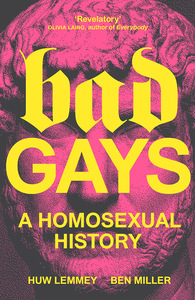You need to sign in or sign up before continuing.
Take a photo of a barcode or cover
I liked this more than I was expecting to, though with caveats. I was anticipating a full-throated critique of the queer community's dogged insistence on "positive representation only" & portraying our history as a relentlessly affirmative forward-march toward liberation. As is rightly pointed out in the introduction, we don't grapple nearly enough with the fact that Lord Alfred Douglas is just as key to a historical understanding of ourselves as Oscar Wilde. Indeed, we willfully overlook deeply problematic behaviors in our canonization of the former, & conveniently forget that latter coined "the love that dare not speak its name," one of our most enduringly beautiful euphemisms. Put another way: we are willing to ascribe inevitable human fallibility in some situations, but not all.
What I wasn't quite expecting was the invitation to reconsider the term "bad" in & of itself—or at least embrace its ambiguity & imprecision. What we consider "bad" as a society at this particular moment in time can be very different than in others, a reality that we as a community, like all marginalized groups, have been both victimized by and wielded to our benefit at various historical junctures. Once again we collectively tend not to wrestle with these dynamics too deeply, & in that sense Bad Gays attempts a much appreciated corrective—& provocation.
But if the book club I read this with is any indication, this underlying argument unfortunately gets a bit muddy in execution, & so our discussion ended up just being mostly about why certain figures were included here, with "X just doesn't seem that bad" a constant puzzled refrain. I think this directly ties to my own personal criticism—which believe me I'm deeply sympathetic to—is that it gets awkwardly suspended between academic & popular writing modes.
So on the one hand for those who are interested in the more theoretical claims they can often feel more signaled than fully articulated (it certainly helps to have some previous knowledge of, say, the extensive scholarly debates around the idea of "queer failure"), but then at the same time are also deployed just enough to cause confusion for those who want to focus primarily on the otherwise engagingly written biographical accounts. It's an underlying tension I sensed as a reader that never manages to feel fully resolved, & in the end compromised the overall impact of the reading experience.
It is not simply that these are fascinating, complex lives that compel us towards understanding homosexuality. They also ask us to pose the question of the whole notion of gay heroes: why do we choose to remember, and why do we choose to forget?
What I wasn't quite expecting was the invitation to reconsider the term "bad" in & of itself—or at least embrace its ambiguity & imprecision. What we consider "bad" as a society at this particular moment in time can be very different than in others, a reality that we as a community, like all marginalized groups, have been both victimized by and wielded to our benefit at various historical junctures. Once again we collectively tend not to wrestle with these dynamics too deeply, & in that sense Bad Gays attempts a much appreciated corrective—& provocation.
But if the book club I read this with is any indication, this underlying argument unfortunately gets a bit muddy in execution, & so our discussion ended up just being mostly about why certain figures were included here, with "X just doesn't seem that bad" a constant puzzled refrain. I think this directly ties to my own personal criticism—which believe me I'm deeply sympathetic to—is that it gets awkwardly suspended between academic & popular writing modes.
So on the one hand for those who are interested in the more theoretical claims they can often feel more signaled than fully articulated (it certainly helps to have some previous knowledge of, say, the extensive scholarly debates around the idea of "queer failure"), but then at the same time are also deployed just enough to cause confusion for those who want to focus primarily on the otherwise engagingly written biographical accounts. It's an underlying tension I sensed as a reader that never manages to feel fully resolved, & in the end compromised the overall impact of the reading experience.
It is not simply that these are fascinating, complex lives that compel us towards understanding homosexuality. They also ask us to pose the question of the whole notion of gay heroes: why do we choose to remember, and why do we choose to forget?
informative
lighthearted
reflective
medium-paced
I love the concept of showing how gay people aren’t a monolith, as well as exploring how their own sense of marginalisation often directly led to them deflecting that persecution onto other (usually ethnic) minorities. I also liked the general historical overviews given as the contextual background for each profile. But what I didn’t like was how the author would do a whole paragraph in a formal style and then throw in a cringey buzz word (‘slay’). Dare I say it felt a bit millennial… but also it did just take me out of the flow. Also I picked up this book because I wanted to read more about historical figures that might be left out of the traditional hetero narrative, and for the most part this was satisfied - but then when I got to a chapter about a woman I was so disappointed. Not because I don’t want to read about queer women - on the contrary, I had assumed from the fact that every profile so far had been a man that the scope of this book was limited to homosexual men, which would have been acceptable because this would have left room for a sequel to explore homosexual women to an equal extent. However to only include one female profile is insulting. Also on a separate note this is the second book I’ve read in a row that has called out Bernard Lewis, the Orientalist - not looking great for him!
funny
informative
reflective
medium-paced
challenging
informative
fast-paced
Graphic: Adult/minor relationship, Homophobia
Moderate: Mental illness, Suicide, Antisemitism, Outing, Colonisation
Minor: Gun violence, Violence
wish there was more storytelling than “in this essay, i will…” grad school energy
Fun, readable, leftist history about historical homos who ranged from a little naughty to outright evil. Worth the read.
informative
reflective
medium-paced
An extensive history book- so you just have to be prepared to be bombarded with facts!
Interesting premise but was a bit dry and over saturated with information. Was expecting stories about each person but there was a ton of extra historical context and side stories added on. Great for history buffs but not a casual read




